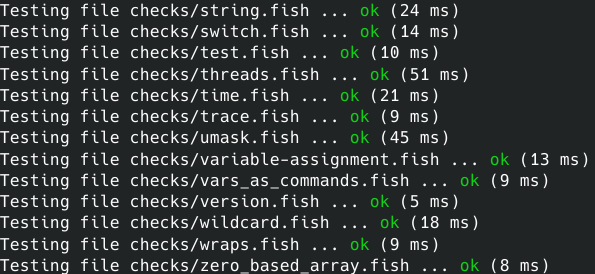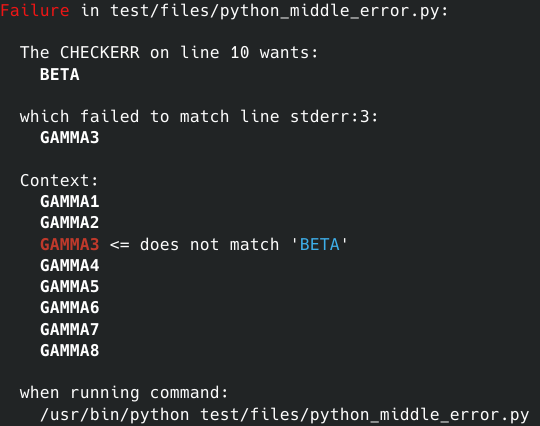littlecheck is a tool for testing command line tools. It is heavily inspired by the lit and FileCheck combo. littlecheck is much simpler: it requires only one Python file and has no dependencies except for Python itself (2.7 or 3).
littlecheck is aimed at programs which process a text file and produce output on stdout and/or stderr. A test file is processed by littlecheck, which reads special directives embedded in comments. The same file is processed by the tool under test, which ignores the comments. littlecheck then verifies the tool's output according to the directives.
An example test for the Python interpreter:
# RUN: /usr/bin/python %s
print("abc") # CHECK: abc
print("%x"%(16**3)) # CHECK: 1000
for i in range(3):
print(i)
# CHECK: 0
# CHECK: 1
# CHECK: 2To run this:
./littlecheck/littlecheck.py test.py
littlecheck will parse out the special comments # RUN and # CHECK:
# RUNspecifies an arbitary shell command.%sis substituted with the path to the input file.# CHECKspecifies an expected output line. littlecheck verifies that the output of the shell command matches the sequence ofCHECKlines.
If no # RUN command has been given, littlecheck will use a given shebang.
The special comments can occur at the beginning of a line, or anywhere in a line that does not start with #.
littlecheck supports regular expressions, using Python's re syntax. Regular expressions are embedded in CHECK lines enclosed in double curly braces.
# RUN: /usr/bin/python %s
print("A big number: ", 2**64)
# CHECK: A big number: {{\d+L}}littlecheck also captures both stdout and stderr:
# RUN: /usr/bin/ruby %s
$stdout.puts "this goes to stdout"
$stderr.puts "this goes to stderr"
# CHECK: this goes to stdout
# CHECKERR: this goes to stderrTo skip tests, littlecheck provides the # REQUIRES directive. Anything given there will be run as a shell command (with /bin/sh, with the substitutions applied), and if any REQUIRES returns non-zero the script will be skipped:
# RUN: /bin/sh %s
# Only run this test on macOS:
# REQUIRES: test $(uname) = Darwin
# Only run it if git is installed
# REQUIRES: command -v gitlittlecheck will exit with status 125 if all tests were skipped. Otherwise, it exits with status 1 with at least one test failed, else 0.
To integrate littlecheck into your project, simply copy the file littlecheck/littlecheck.py into the appropriate place in your source tree. No other files are required.
Run make test to run the tests.
- littlecheck currently only supports
#comments. Other commenting styles would be straightforward to add. - littlecheck does not yet support all substitutions of
lit. It supports%sand%%, and custom ones via the-soption. - littlecheck does not support the
CHECKandCHECK-NEXTdistinction. All lines are expected to be present, except that empty output lines are ignored. - littlecheck permits leading whitespace on matching lines and does not yet support something like the
--strict-whitespaceoption to FileCheck.
littlecheck is released into the public domain. You may use it for any purpose without attribution, or under the CC0 license if public domain is not available.


